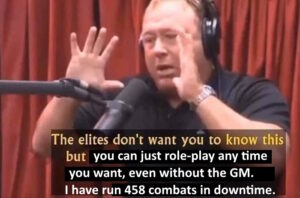 When every player is actively engaged with every other player, this opens up the possibility for role-playing well beyond the conventional model of play.
When every player is actively engaged with every other player, this opens up the possibility for role-playing well beyond the conventional model of play.
In conventional play, meaningful role-play is limited to player-GM interactions. Sure, you can role-play conversations within the party, and those in-character negotiations can influence the direction in which the party pursues GM-defined goals. That’s small potatoes in the larger scheme of the campaign, though. You’re still limited to conversations whose results are brought before the throne of the god-GM where you ask for his blessings on the results of your conversation. The rate limiting factor is the GM’s attention. He can only really deal with one player at a time, and his own time is limited.
The generally agreed upon method of conventional play assumes the bulk of role-play will happen at the table, during game sessions, with maybe a smattering of role-play via text or post during ‘stop time’ between sessions. These again have serious limitations as the concepts of ‘player versus character’ knowledge and the freezing of the campaign state between sessions rear their ugly heads.
Consider the alternative method of game-play: the Total Nonstop Braunstein. Under this model, and (maybe) the burgeoning classic adventure game model, players don’t need the GM’s permission to role-play. This opens up new avenues of in-character role-play.
For one thing, you aren’t limited to negotiations with just the GM. Instead of one guy dealing with a rotating cast of one guy at a time, you have multiple players all interacting with each other. And under the TNB model every player’s negotiation with other players has just as much effect on the campaign state as the one-on-one model. The independent interactions of multiple players leads to an exponettial increase in possible outcomes. Instead of the binary gates of conventional play – do we follow the GMs railroad or not – you get an open field of potential in which to frolic.
Even in the case of Westmarches style games, you’re still just a unified collective negotiating as a team. You’re playing in one dimension. And you still face the barrier of the GM’s time.
In a PvP campaign, properly run with copious amounts of downtime, you’ve literally got all the time in the world to role-play, and more than just one person with which to do it. You can pick up the phone and, even if the DM is busy, contact another player and another faction, and play out whatever sort of negotiation – or even combat! – your heart desires. You don’t need the neutral referee’s permission to do so. You can just go out and role-play.
It’s really just that simple.
You’d think the theater kids and storygame people would be all over this style of play. Why they cling desperately to the flotsam of traditional play in the face of all evidence of better methods is left as an exercise for the reader.


